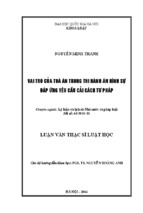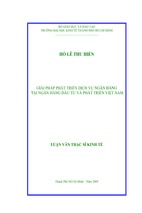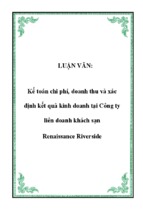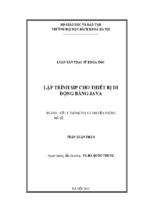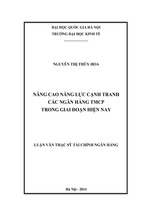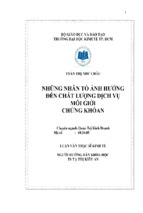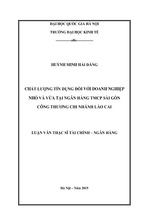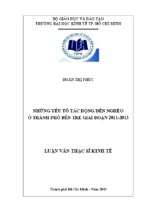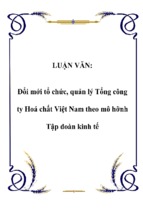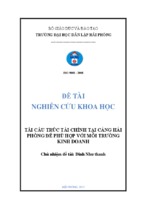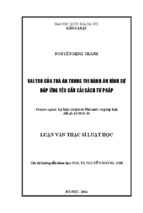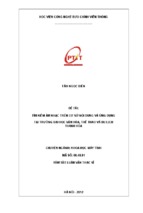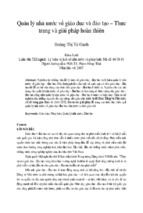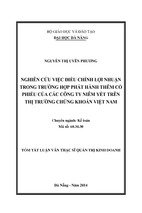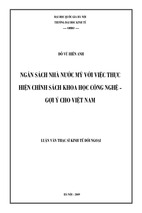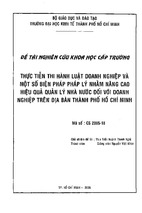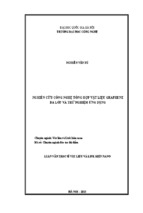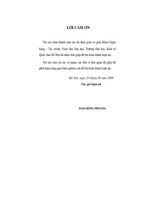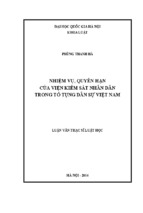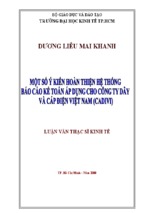MINISTRY OF CULTURE, SPORTS & TOURIS MINISTRY OF EDUCATION & TRAINING
HANOI UNIVERSITY OF CULTURE
DO TIEN VUONG
RESERACH OF INFORMATION SYSTEM
FOR TRANING AT TECHNICAL UNIVERSITIES
IN VIETNAM
Major: Library and Information
Science Code: 62320203
DOCTORAL THESIS
SUMMARY
HANOI, 2016
The thesis is completed at:
Hanoi University of Culture
Supervisors: Assoc. Prof. Ph.D. Nguyen Huu Hung
Reviewer 1: Assoc. Prof. Ph.D. Tran Thi Quy
University of Social Sciences and Humanities
Reviewer 2: Assoc. Prof. Ph.D. Mai Ha
Ministry of Science and Technology
Reviewer 3: Assoc. Prof. Ph.D. Nguyen Thi Lan Thanh
Hanoi University of Culture
This thesis will be defended at the university evaluation
committee, held at: Hanoi University of Culture
No. 418 La Thanh Road, Dong Da District, Hanoi
Time: …..hour….. date……month …… year 201…
This thesis is available at:
- National Library of Vietnam;
- Library and Information Center, Hanoi University of Culture.
1
INTRODUCTION
1. The reasons for choosing this subject
In these years of national renewal, Education and Training play an
extremely important role in social life. Education and Training are considered
the responsibilities of the Party, the State and the entire population. Along
with Science and Technology, Education and Training are also considered the
top national policies, the decisive factors in economic growth and social
development, contributing significantly to the progress of industrialization
and modernization of the country.
Therefore, the Vietnamese Party and Government are particularly
interested in innovation and development of Education and Training, expressed
in many legal documents which were promulgated, as in Resolution 29/NQ/TW
Conference TW8 (XI) dated 4/11/2013. The Prime Minister’s Directive
No.02/CT-TTg also stressed : “Any country, Vietnam is not an exception,
education is the foundation for the development of industrialization and
modernization”.
To develop Education and Training, Information and Library activities
play an important role. Under the angle of state management, Ministry of
Education and Training issued Decision 65/2007/QD-BGDĐT on the criterion
of educational quality evaluation in Universities, in which standard number 9
for libraries specified: “Libraries of the Universities are full of books,
textbooks, reference in Vietnamese and foreign languages to meet the demands
of cadres, teachers and learners. Electronic libraries connected to the Internet,
useful in teaching, studying and researching science effectively.
However, in fact, the current network of Information and Library
agencies has many inadequacies, reflected in every aspect; from the
organizational models, operational modes to the specific professional
processes. At Universities, although the Information and Library
organization has been operating for many years, there are still many
shortcomings in its capacity, a fundamental cause of this situation is that
Universities work separately and not as a system. They do not cooperate or
share resources to improve the quality of information assurance for
information users.
The theoretical and practical system of Information and Library
activities show, Information System is an effective tool to solve the problem of
ensuring information for economic and social activities. Around the world,
many countries have programs to support universities in developing
Information Systems for training on the basis of integration and cooperation,
using all resources of the member units.
For these reasons, the author has chosen the subject “Research of
Information System for training at technical universities in Vietnam” in
the thesis of information library science.
2
2. History of research issues
The subject of Information System has attracted the attention of many
scientists around the world. There are also many typical theoretical studies
published by authors S. O'Bien and Haag, M. Cummings and J. Dawkin.
The scientific basis of Information System is theoretical system with its
foundation is the work of three renowned scientists such as: L. Von Bertalarffy,
Kenneth E. Boulding and Stefferd Beer. The problems of the theory and
practice of the Information System, the applications of Information System in
the field of economy, social, education and training, Science and Technology
has attracted the attention of many scientists. In recent years, the research of
Information and Library system has also attracted the attention of researchers,
such as G. Salton, T.D. Wilson; F.W. Lancaster and C.W, Cleverdon.
In Vietnam, the research on the Information Systems was started in
the 1980s and published by authors Ngo Trung Viet, Phan Huy
Khanh....concentrating on the basic knowledge of system, information,
information system, information system analysis and design. The research
on the organization and management of information systems in the field of
Science and Technology, Education and Training were also implemented,
involved significant thesis of authors Nguyen Huu Hung, Doan Phan Tan,
Vương Thanh Huong va Dang Tran Khanh.
Generally, these works fill with value in both theory and practice and
can be refered to build the Information system. For technical universities in
our country, Information and Library system is still a new research contains
many scientific and practical problems: Organisation, operation and process
haven’t been studied completely.
This thesis helps to solve these problems.
3. Research aims and tasks
3.1. Research aims.
The research clarifes scientific evidences, practical basis and
proposes a model of Information and Library system for training at
Technical universities in Vietnam.
3.2 The research tasks.
To achieve these aims, the thesis addresses the following objectives:
- Research overview and systematize the theoretical basis of
Information and Library system and the practical basis of Information
Systems at Technical universities.
- Research, analyze and assess the current status of components of the
Information system at Technical universities in Viet Nam.
- Recommend solutions and models in operating model of
Information system at Technical universities in Viet Nam.
3
4. Research targets and scopes
4.1. Research targets: Information and Library systems at the
Technical universities in Vietnam
4.2. Research scopes
- Spatial (regional) research: The thesis used data of 16 Technical
universities in Vietnam.
- Time research: From 2010 to now, Technical universities have been
effectuating the entire renovation in Education and Training, moving
training methods from annual to credits.
5. Methods of research
5.1 Methodology
The thesis uses the methodology of dialectical materialism, historical
materialism as well as grasps thoroughly viewpoints, guidelines and
policies of the Party and the State on Information and Library activities.
5.2 Specific Methods
- Method of analysis and synthesis material: To assess the views of
scholars, schools of theoretical and draw the studied issues, the added
issues and new researches.
- Method of modeling: To propose a model of the Information
system at Technical universities in Viet Nam based on the results of the
research.
- Method of system analysis: To review the system, find out the
structures and characteristics as well as other specific issues related to the
system
- Method of sociological survey: Use the survey method through
questionnaires and experts method.
+ Survey method by questionnaires: Conduct to choose sampling survey.
+ Interview the experts, scientists, managers of library and
information industry, IT, education ... to clarify the research issues.
- Statistical method: To handle survey data the current situation of
components of the Information system at Technical universities in Viet Nam,
Use the statistical forms to illustrate research issues.
To conduct the survey by questionnaires, the thesis has conducted to
choose sampling surveys: Fellows sampled according to geographical
features of the country's regions (North, Central and South). In each region,
the survey samples were selected on the principle of stratification based on
these criteria: Technical universities that have a large and medium scale in
training; Universities that are prestigious and have long history of training,
team of highly qualified teachers, a big number of information users, modern
IT infrastructures, abundant information resourses, regional universities, local
universities specialized training in science and technology.
4
The results of sample survey included 16 Technical universities, in
which 10/20 Technical universities in the North, 2/6 Technical universities in
the Central and 4/12 Technical universities in the South.
Respondents of inteview and investigation included 2 samples:
Forms of survey leaders of Information and Library agencies at
Technical universities. Forms of information demand investigation of 3
information user groups: Managers; Lecturers, Researchers; Regular University
Students.
- 16 forms were issued to leaders of Information and Library agencies at
Technical universities and gathered in 16 (100%).
- The number of demand investigation forms of 3 information user
groups at Technical universities:
+ 160 forms were issued to Managers (randomly selected 10 Managers
every university) and gathered in 155 (96.9%)
+ 300 forms were issued to Lecturers, Researchers (randomly selected
19 Lecturers/Researchers every university) and gathered in 257 (85.7%).
+ 1.200 forms were issued to Regular University Students and gathered
in 1.142 (95.2%)
6. Theoretical and practical meaning of the thesis.
6.1: Theoretical meaning
The thesis helps to clarify some theoretical and practical issues of
Information systems at Technical universities; justify models and approaches to
build Information systems fit with training systems at Technical universities,
raise the quality of training, scientific research and transfer technology among
universities.
6.2 Practical meaning
The results of this research provide points to help the State
management agencies in higher education, library and information sectors
and leaders of universities, library and information agencies in planning and
developing construction for Information and Library system at Technical
universities in Viet Nam. Besides, the results of the thesis are also a
reference for research, learning and operation of information officials at
Technical universities in Viet Nam.
7. The layout of the thesis
Besides the introduction, conclusion, recommendation, references and
appendices, the thesis is structured into three chapters:
Chapter 1. Theoretical and practical basis of Information systems at
Technical universities
Chapter 2. Status of components of information systems at Technical
universities in Viet Nam.
Chapter 3. Recommend models and solutions for implementing
Information systems at Technical universities in Viet Nam.
5
Chapter 1
THEORETICAL AND PRACTICAL BASIS OF INFORMATION
SYSTEMS AT TECHNICAL UNIVERSITIES
1.1. Theoretical basis of information systems at technical
universities
1.1.1 The basic concepts
1.1.1. Information
There are many different concepts and approaches about information.
In the thesis, information is understood as material, data, knowledge and
advocacy
existing
in
the
process,
storage,
search
and
streaming….Information using creates understanding and alters the behaviors
and activities of people in society. Information is recorded, stored on a
tangible medium such as papers, magnetic tapes, computers, servers… It can
be generated, processed, transmitted, searched, copied, duplicated and even
distorted and destroyed.
1.1.1.2 System
The system is understood as a set of interactive elements into a
structure to fulfill a common goal under the impact of the environment. The
system also encompasses the meaning of organization forms orderly to form
a perfect whole. For each system, a superior nature is called “dominant” but
no a stand-alone element has.
1.1.1.3 Information system
In the thesis, the system information is understood as a set of
information units, organized according to a certain order, has interaction
with each other, performs the function and process information to that
organization. The system information is created by 3 component groups:
Organizational component group that collects information units with a
mutual relationship. Functional component group that operates functions
such as: collecting, processing, storing and providing information.
Guaranteed component group that ensures the operation of the system,
including humans; technical infrastructure, information technology
infrastructure, financial and information resources. These groups have the
same relationship with each other to perform the functions: gathering,
processing, storing and distributing information/documents and provide a
feedback mechanism to achieve the goals, requirements of the organization
1.1.1.4 Information systems at technical universities
Information systems at Technical universities in this thesis are
essentially Information and Library system at Technical universities. These
information systems have data flow to be rotated and managed.
To Professor TD Wilson, UK, Information systems of universities include
factors related to the implementation of functions: collecting, processing, storing
6
and providing information from the source, documentation to ensure information
for information users, improve the effectiveness of teaching and training.
Professor G. Salton of Cornell University, the United States says that
there are three approaches to solve the construction of Information and Library
system at present. First, keep the old system and automate some tasks or
operational processes in Information and Library agencies. Second, build a
system based on cooperation and integration of current systems/ Information
and Library agencies to use all resources of the member units to tackle the task
(goal) of the system. Third, build a completely new Information and Library
information with fundamental change all stages, from the organizations,
processes to means.
In fact, the second approach is common and easy to fit in the
construction and modernization of current Information and Library systems.
The formulation is based on the network of Information and Library agencies
available, make use of all resources such as information resource in universities
and integrating processes in the Information and Library agencies at
universities.
Information systems at Technical universities have dual functions: First, is a
tool to manage information as an asset and resource of university. This information
is in the form of published and not published in accordance with the training
programs of member universities. Second, is a tool to help participate in the process
of improving the quality of education and scientific research at universities.
Information and Library systems at Technical universities support
teaching, learning and researching by ensuring timely information for users.
To ensure the objectives of information systems, Technical universities
should improve operational efficiency of the Information and Library agencies,
must address issues such as: Ensuring the operation of the Information and
Library agencies at universities on a unified mechanism; Organizing
Information and Library processes on the basis of ensuring interoperability in
terms of information library in the stages with the appropriate procedures and
uniform standards; comprehensive approaching to the modernization on the
basis of rational use of technology.
From the above premises, Information systems at Technical universities in
the thesis is understood as a set of Information and Library agencies that are
organized and operated under a unified mechanism to perform the duties such as
collection, process, storage and provide information from sources published and
not published to ensure information and satisfy the needs of different information
users in training and studying and scientific research at universities. In terms of
structure, this system consists of three components: organizational system
components, functional components (operating systems) and guaranteed
components to ensure the operation of the system (human, facility physical and
IT infrastructure, finance, information resources, legal). These components have a
mutual relationship with each other to implement the information.
7
1.1.2 The components of information systems at Technical universities.
From concept of information systems at Technical universities, the
systems are defined by three main components: organizational system
components, functional components (operating systems) and guaranteed
components to ensure the operation of the system). These components have
a mutual relationship with each other to operate and develop the systems.
1.1.2.1 Organized system components
The organized components of systems at Technical universities
include Information and Library agencies that perform functions related to
library and information activities such as: Collecting, processing, storing and
providing information to the users, These agencies make up the system. As
every organizational system, to operate university information system,
unified operating mechanism are needed through regulations include
provisions, binding rules for each member organization in the system, ensure
the rights and responsibilities of each university participating in the system.
1.1.2.2 Functional components (operating) system
Functional components (activities) of information systems at Technical
universities toward the implementation of the small objectives of the
Information systems (actually the functional modules of the system) as:
Collecting, processing, storing and supplying information for the users at
universities.
1.1.2.3 Guaranteed components
Guaranteed components are tools, means and conditions for implementing the
small goals of the information systems at Technical universities. In these systems,
guaranteed components mainly include: human, facility physical and IT
infrastructure, finance, information resources.
1.1.3 Factors affect Information and Library systems at Technical
universities
Manpower, Perception of leadership, Information users,
Revolutionary of Science and Technology, Economic, Cultural and Political
education; Training environment.
1.1.4 Requirements, principles and methods of building
information system for technical universities
1.1.4.1 Requirements of information system
Originating from training requirements, the Information system of
technical universities must meet the following requirements: Modernity and
systematicity ; Sustainability and scientificity; Openness and development;
Target- orientation: Conciseness and logicality; Professionalism; Timeliness
and flexibility of information; Safety, security.
8
1.1.4.2 Principles of information system construction
Building Information system includes various principles, of which
the following principles need to be observed: highest leadership principle;
new math principle; system access principle; open system principle;
principle of reliability assurance
1.1.4.3 Method of library information system construction
There are 3 major methods of studying system building:
Modeling method: is the method reappearing characteristics of
researched objects by a model when major research to such object cannot
be done.
Black box method: This is the study method when knowing output,
input of the system, but not master its structure;
System analysis method considers systematic approach from levels:
Overview (macro), details (microfinance) and approach associated with the
process.
With limitations in research object and complexity of the problem,
suitable for Vietnam conditions, to build model of information system
organization in the thesis, the author uses the modeling method in
combination with the system analysis method. The thesis has surveyed and
brought models of main parts of the Information system such as: in terms
of organization, functions, interactions among system assuring components.
1.1.5 Operational effectiveness of information systems in technical
universities
The thesis gives out some different opinions about effectiveness:
Following F. W. Lancaster: Effectiveness is measured by level of
demand satisfaction of information userss. Information userss pay attention
to final results of the information system other than how the information
system operates.
Pr. T.D Wilson: Effectiveness of the information system is defined by criteria
of success, effectiveness, benefits, performance and costs.
In conditions of the thesis, the author considers effectiveness through
evaluating system components: system organization part, system function
(operation) part and part ensuring system operation.
1.2. Practical bases of information system in technical universities
1.2.1 Innovation of higher education and issues to building
information system for training
Ministry of Education and Training issued the regulation of
university training and regular college according to the credit system,
starting from school year 2007 – 2008 which takes training schedule into
Vietnam education system, HCMC University of Technology is the first
university applying this training type, following by University of transport
9
and communications and other university of economy in the country also
apply training according to the credit system. Generally requirements on
education and training system innovation is mentioned fully in Decree 29 of
The Central Executive Committee.
1.2.2. Characteristics of technical universities in Vietnam
1.2.2.1. Functions, obligations of universities
Following UNESCO, the higher education performs four functions:
First, prepare students to enjoy research and teaching activities;
Second; provide advanced training course to meet manpower needs
for the society;
Third, promote international cooperation via internationalization of
scientific research activities, creation of affiliate network of scientific ideas;
Four, expand education chances for everyone, meet various issues of
the lifelong education.
Regulations of university define, universities in general and technical
universities in particular perform obligations and rights under regulations in
Article 28 of Law on Higher education as follows:
Build strategies, plans to develop higher-education foundations;
Develop training activities, international cooperation, and assurance
of higher-education quality;
Develop training programs by identified objects; ensure connection
between the program and the level of training
Organization structure; recruitment, management, construction, training
for teachers, management staff, officers and employees;
Perform mode of information, report and under inspection and check
of Ministry of Education and Training, relating departments and Provincial
People's Committees where higher-education establishments place.
Develop cooperation in training and science research with
universities, science organizations and foreign enterprises.
1.2.2.2. Training sectors of universities
In addition of the revolution of modern science and technology and
analysis trend, there is trend of integrating making science and technology
(S&T) sectors have common S&T foundations. Therefore, technical
universities, including multidisciplinary training schools such as University
of Technology, or specialization such as University of transport and
communications, Construction, Irrigation… also have many same
subjects/studying sectors.
1.2.2.3. Scope of training
Technical universities are active to research and develop to perform
training by social needs, especially moving yearly training forms unto
training by credit. Many sectors increase annual training scope in order to
10
meet S&T manpower for the economy of many components, many
universities diversify the types of training, open many new major, new
technology, and advanced training programs.
1.2.2.4. Lecchers and scientists
Technical universities have teachers and scientists: Academician,
Professor, Associate Professor, PhD, Dr. of S&T, Technology. Many
teaching staff of universities have published reports on international
scientific journals of reputation: A&HCI/SSCI/SCI, SCIE, ISI, SCOPUS,...
1.2.2.5 Characteristics of information system in technical universities
Information needs of information users in the field of engineering,
technology are often highly accurate expression, with a volatility according
to speed development and technical innovation cycles and technology;
Currents in the fields of engineering, technology has rapid growth,
consolidation is highly concentrated, become obsolete faster than other
knowledge industries;
Type of document is more diverse, beside published and nonpublished document types, a significant making up of the group specialized
format documents such as standards, patents, technical reports, drawings,
technical documents,...
Language of information document in the fields of engineering,
technology has tighter structure, in which uses many formulas, models,
charts, drawings…
1.2.3 Roles of information system in technical universities
The information system of universities plays mediating role between
system and environment, in order to provide enough information, exactly
and in time to ensure information for information users in the system.
The information system renovates teaching – learning method: To
teach and learning with high effectiveness, increasing self-study time of
students with support of University library information agency is very
necessary.
In conclusion, it can be said that, the information system in technical
universities keeps important role in improving capacity to ensure
information in universities and having a positive impact in training and
science research, in time as measure of the efficiency of the training
activities of these universities, contributing to improve quality of S&T
manpower training suitable with requirements of the society and of
engineering, technology industry.
1.2.4 Experience in organizing information system in technical
universities in the world
In the world, in countries with advanced education, universities have
experiences in information system research, construction and operation.
11
There are many types of information system, in scopes of various
organization and operation methods. Fellows perform study cases for three
representatives: Information system of US technical universities; Information
system of Australia technical universities; Information system of Singapore
technical universities.
Sub-conclusion
The information system in technical universities is a collection of
University library information agency which is organized and operated
according to an agreed mechanism in order to perform obligations of collection,
solution, storage and information provision from published and non-published
document information resources with the goal of ensuring the information
serves the universities’ training. In terms of structure, the information system is
structured by three component groups: System organization part, system
function (operation) part and part to ensure system operation, such parts have
mutual relationship with each other in order to perform information processes.
Construction of information system in technical universities are
governed by and subject to the influence of the practical problems as
natures of universities: Function, obligations; training sectors; scope of
training; teachers and characteristics of information system in technical
universities. In order to find experience on organization and system
operation mode, then consider to apply to build information system in
technical universities in the current period, fellows have researched
information system organization experience in some universities in the
world: US universities, Australia universities and Singapore universities.
12
Chapter 2
STATUS OF INFORMATION SYSTEM COMPONENTS
IN VIETNAM TECHNICAL UNIVERSITIES
Library information activities in many technical universities have
time accompany the existence of universities. Because information system
activities in technical universities just only in each university in last time,
such technical universities have not yet established the information system.
However, today some component factors of the system have been
established. In this chapter, we survey system components: System
organization part, system function (operation) part and part to ensure
system operation and offer extensive evaluation of these components.
2.1. Status of information system organization in technical
universities
Today in Vietnam universities in general and technical universities
have not built the common information system but initially formed two
networks University library information agency. These are Union Library
Association of Northern universities and Union Library Association of
Southern universities.
2.1.1. Functions, obligations and name of library information
agency in technical universities
University library information agency has function serving teaching,
studying, training, science research, advanced application development of
S&T and management of universities by using and exploring documents in
the library (handwritten documents, printing, photocopying, engraving on
all materials, electronic documents, Internet,…).
University library information agency has following obligations:
Advise the Director, Rector of the University (hereafter called as
“Rector”) to build planning, long-term and short-term activity plan of
library; organize to coordinate all information systems, documents, libraries
in university;
Add, develop information resource in domestic and abroad to meet
demands of teaching, studying, science research and technical transfer of
universities;
Organize, handle, arrange, store, maintain, control documents; build
appropriate reference system; establish network access and information
search automation; build databases;…
Study, apply advanced S&T and IT achievements into library work;
Name of University library information agency is very diverse. The
survey shows that popular name of the agency is: Library associated with
University name agency 8/16 (making up 50%); Name of Learning
13
Resource Center associated with University name agency 1/16 (making up
6.3%); Followed by Library information center associated with University
name agency 6/15 (making up 37.5%),…
2.1.2 Organization of University library information agencies
University library information agencies surveyed in 16 technical
universities have organization structure as subdivisions of the university
managing board. This is suitable with regulation in article 5 on organization
structure of university library “as unit in organization structure of university
including library leader and specialized departments (teams) under the
university managing board”.
2.2 Status of information system activities in technical
universities
Library information activities include process: information
collection, information solution, information storage and information
service product provision to information users.
2.2.1 Information collection
Information collection in University library information agencies in
technical universities based on internal adding policies, in which
information is collected from various sources. Such sources depending on
level of solution are classified into three information level: level 1, 2 and 3.
Information sources are collected and exploited by aspects such as:
document types; According to the information objects; According to an
overarching theme.
To choose information sources, libraries of technical universities
base on following criteria: reputation; purpose; coverage and topicality of
the information.
2.2.2 Information solution
Now, University library information agencies often apply some
information solution forms as: Classification, the subject, the keywords, and
summary. Survey reports collect following results: In information solution
forms applied in University library information agencies, document
classification is the most popular information solution system, followed by
cataloging description, the keywords, a summary, the theme. About
profession, University library information agencies apply professional
standards of Ministry of Culture, Sport and Tourism in 2007 is cataloguing
reading machine MARC21, UK-US cataloguing description AACR2 and
classification DDC.
2.2.3 Information storage
Surveys show that, 100% University library information agencies
stores information through two types: Traditional information storage and
modern information storage.
14
In modern information storage environment, almost information is
storage in database. In schools of database, number collection can be
searched, exploited through Web or can read all in LAN network in
University library information agencies of universities. So that, today,
library website is the main information gate helping information users find,
exploit information most effectively.
2.2.4 Provide information products and services
Information products: University library information agencies in
technical universities have created information products as: Electronic
information publications; Scientific reports at all levels; Symposium
Proceedings; Database of Masters thesis, PhD thesis; Online Database,
Offline Database. In such Information products, surveys show that almost
information users care about using information publications; Database.
Information service: in technical universities, now provide
information users quite varied and rich, specific information services: Find
information in folder; Find information on CD-ROM; Find information on
Internet; Provide documents; Advise, exchange information; Selective
dissemination of information; Reference services; Photocopy and printing
documents.
2.3 Parts to ensure information system operation in technical
universities
2.3.1 Technical facilities, infrastructure and information
technology, finance
2.3.1.1 Technical facilities
Survey results show that, Technical facilities in University library
information agencies are equipped quite well, University library
information agencies has quite large area, number of reader seats is large,
meeting requirements of information users; equipment is equipped modern
serving specialization work and library management work.
2.3.1.2 Information technical facilities
University library information agencies are invested strongly into
building Information technical facilities, such as host, stations, Wireless and
integrated library administration software.
2.3.1.3 Finance
Funding source for current Information system operation almost is
funding supplied by the State. Besides, University library information
agencies also expand other financial channels such as: donations of local,
international organizations, and socialization, collect from services of
library as exploiting information resource and selling information
publications.
15
2.3.2 Manpower of library information
Staff potential of University library information agencies is
evaluated by targets of quality, quantity and structure of staff.
Based on survey data, analysis results of library information
manpower in University library information agencies in technical
universities are divided into aspects: Age and gender; Qualifications,
training programs.
2.3.3 Information userss
2.3.3.1 Natures of information userss
In universities, information userss are all teachers, science research
staff, employees, fellows, higher-education students, students in
universities.
Universities can divide into 3 information users groups, equivalent to
3 characteristics using information resource in University library
information agencies is leading officers and managers; teachers and
studying staff and students.
2.3.3.2 Information demands
Demands of information users on using covering topics in universities.
Demands of information users on using information resource of University
library information agencies of other University library information agencies.
Demands of information users on building the information system in
technical universities in Vietnam.
2.3.4 Information resources
In University library information agencies in technical universities,
surveys carried out collection, establishment and managing an information
resource various, including printing document capital such as: Books,
magazines, maps, science research result report, scientific symposium
proceedings, master thesis, doctoral dissertation, report the results of
scientific research. Electric information resource including: Electronic
journals, electronic books, Database, number collections, CD.
Surveys show that information resource connecting and sharing
among University library information agencies is the essential requirement.
Now: there are 14/16 universities (making up 87.5%) taking part in
University Library Associations for training work by the form of
workshops, professional courses organization.
2.3.5 Legal environment
Higher education and university library information activities are
interested by the Party and State in recent years which are shown in two
following legal document groups: Legal documents relating to higher
education and legal documents relating to university library information
activities.
16
2.4 Overall assessment of the information system components in
technical universities
2.4.1 System operation components
2.4.1.1 Achieved results
Library information agency organization is interested to invest by
Ministry of Education – Training, departments and technical universities on
a better. Almost domestic technical universities have organized University
library information agencies and under Board of Rectors.
2.4.1.2 Remaining issues
Components of system organization: Depending on economic
potential, mission function and knowledge of leaders of each technical
university, organization size and different forms, asynchronously in the
Governing, different organization structure, because of under managing unit
of the different universities.
2.4.2. System operation components
2.4.2.1. Achievements
Library information activities have been recently focused, especially
after changing yearly system training form into credit system one. Most are
stages in library information process from collecting, processing and storing
the information and providing the information which partially met Users’
demands.
2.4.2.2. Unsettled issues
System operation components: The Library and Information Agencies do
not operate systematically; new activities do not follow the local mechanism with
spontaneous, faint, discrete characters and do not show the positive interaction of
library information system such as:
Collecting information (self-supplement) and sharing information
resource is also independent in strategy of creating the information resource
and duplicate information in many agencies. Document supplement fund is
still limited. Information processing of library information agencies is not
uniform in application of international standards for processing such as
DDC, AACR2, MARC21 toward RDA…etc. and IT standards make data
users difficult to find out the information and sharing information among
library information agencies
Information storage is dispersed in many places: In the physical store
of library information agencies; although there is the content store, agencies
have not built the cooperation mechanism for information storage.
Providing information products and services is only conducted
within an agency, Users do not exploit the information products and
services at other libraries in technology universities; In recent years, the
universities have limited to make investment for the library information
17
activities; there is no investment policy and cooperation mechanisms in
library information activities between the universities.
2.4.3. Components to ensure the system operation
2.4.3.1. Achievements
Human resources; Information users; technical infrastructure,
information technology infrastructure; Information resources; information
product and service system; awareness of stakeholders.
2.4.3.2. Unsettled issues
In addition to these achievements, components to ensure the system
operation also have following some problems:
Human resources; Information users; technical infrastructure,
information technology infrastructure; Information resources; information
product and service system; awareness of stakeholders.
2.6.3. Reasons
Firstly, due to the awareness of role of library information activities
of educational managers, library field, technical universities, and library
information activities are not focused yet. Secondly, technical universities
do not have the training mechanism such as intensive training courses in
information extraction, IT, digital content administration...etc. Thirdly,
financial condition of universities does not allow investing comprehensive
information library activities.
Sub-conclusion
Development of library information activities in past time in
technical universities has formed some component elements as premise of
information system in universities such as organization of library
information agencies, information resources and other factors to ensure the
library and information activities such as facilities, staffs. The recent library
information operation in technical universities is done under the
autonomous mode. Therefore, in order to proceed to build the information
system at technical universities, coming time, it is necessary to solve some
fundamental issues such as establishing organizational system model,
developing the systematic mechanism of activity coordination in effective
integration of elements to ensure the operation in member technical
universities of the system.
18
Chapter 3
PROPOSED MODEL AND SOLUTIONS TO IMPLEMENT
THE INFORMATION SYSTEM MODEL FOR TECHNICAL
UNIVERSITIES IN VIETNAM
3.1. Proposed model of information system for technical
universities in Vietnam
3.1.1. Orientation of model
The information system for technical universities in the future is an
integration system of library information agencies, processes and resources.
On the basis of applying system theory, communication system model will
be considered, oriented to the integration of organizational structures,
library information activity procedures such as collecting, processing,
storing and providing the information. The interaction increase of
components in the system will reduce duplication of information, increase
the cover and the full extent and save the fund.
3.1.2. Objectives and tasks of system
3.1.2.1. Objectives
Derived from functions and tasks of universities, actual library
information activities, information system, the technical universities shall
achieve the following objectives:
General objectives: Firstly, ensure collecting and obtaining the
information from foreign and domestic technical documents, especially at
universities which are members of the system; Secondly, cooperate among
universities to improve information processing, management, creating and
exploiting specific information service products; create and expand link,
exchange of information resources to foreign technical universities,
primarily to universities at nations in Asia - Pacific area.
Specific objectives: Firstly, improve the activity efficiency of each
library information agency; secondly, develop the information system for
the technical universities and bring the information knowledge to the Users
to help them use in maximum information resources, information service
products ...etc.
3.1.2.2. Objectives of information system at technical universities
In order to obtain the above objectives, the information system
shall achieve the following main duties:
Build the information resources; create common information space;
give training Information staffs and Users
- Xem thêm -

